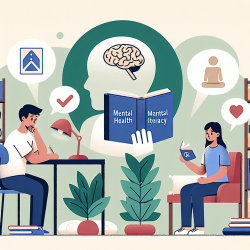Introduction
In recent years, the mental health of postsecondary students has become a focal point for educational institutions and health professionals alike. With the onset of mental disorders often occurring during adolescence, the transition to postsecondary life presents unique challenges that can exacerbate existing mental health issues or lead to new ones. The study titled The Impact of Transitions, a Mental Health Literacy Intervention With Embedded Life Skills for Postsecondary Students: Preliminary Findings From a Naturalistic Cohort Study offers valuable insights into how mental health literacy interventions can be effectively implemented to support students during this critical period.
Understanding the Research
The study conducted by Wei et al. involved 2,397 students from five Canadian postsecondary institutions. It aimed to assess the effectiveness of the "Transitions" mental health literacy intervention, which is designed to improve mental health knowledge, reduce stigma, and enhance help-seeking behaviors among first-year students. The intervention included information on academic life, mental health, stress management, and healthy relationships, tailored to the unique needs of students transitioning to postsecondary education.
Key Findings
The study's results were promising, showing significant improvements in several areas for students who participated in the intervention:
- Increased mental health knowledge
- Reduced stigma against mental illness
- Improved attitudes and behaviors towards seeking help
- Decreased perceived stress
However, the study did not find significant changes in general health, which may be attributed to the relatively short follow-up period of two months.
Implications for Practitioners
For practitioners working with postsecondary students, these findings underscore the importance of integrating mental health literacy into life skills education. Here are some actionable steps practitioners can take:
- Incorporate Mental Health Literacy: Embed mental health education into existing life skills programs to enhance students' understanding and coping mechanisms.
- Tailor Interventions: Customize interventions to fit the cultural and contextual needs of the student population, allowing for flexible delivery methods.
- Focus on Help-Seeking Behaviors: Encourage students to seek help by reducing stigma and providing clear information on available resources.
- Extend Follow-Up Periods: Consider longer follow-up periods to better assess the impact on general health and long-term outcomes.
Encouraging Further Research
While the study provides valuable insights, it also highlights areas for further research. Practitioners are encouraged to explore the following:
- Investigate the long-term effects of mental health literacy interventions on general health.
- Examine the impact of such interventions on diverse student populations, including those from different cultural backgrounds.
- Explore the integration of mental health literacy with digital and online platforms, especially in the context of remote learning.
Conclusion
The "Transitions" intervention demonstrates the potential of mental health literacy programs to positively influence student outcomes. By implementing these findings, practitioners can enhance their skills and contribute to the well-being of students during their transition to postsecondary life.
To read the original research paper, please follow this link: The Impact of Transitions, a Mental Health Literacy Intervention With Embedded Life Skills for Postsecondary Students: Preliminary Findings From a Naturalistic Cohort Study.










